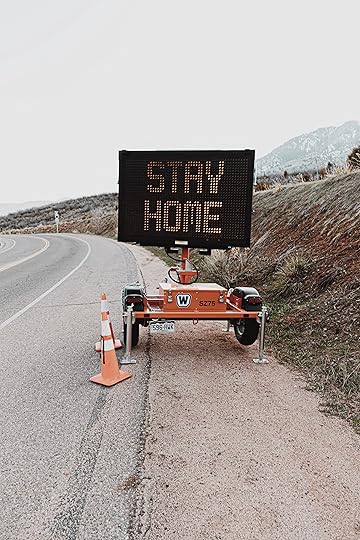Ransom Stephens's Blog
September 22, 2025
One Leaf
A poem for the Autumnal equinox
 Photo by Polina Grishma on Unsplash
Photo by Polina Grishma on UnsplashJust one, coming down
coming down
Canary yellow, summer squash, autumn sunlight
yellow
barely a breeze, the others manage
to cling to their trees
How does the humble horse chestnut
rooted to the creek,
reaching between maples, Bay Laurels, oaks
Decide?
Who to let go
on that cool autumn day
Just one, coming down
wisping in one direction
falling in another
drifting on the gentle wind
between branches, coming down
Settling in the creek’s still shoal
sending ripples
Just one yellow leaf
taken from a tree
Then, caught by the current
carried around rocks
to a rapid
to a calm and on
All of the leaves will fall eventually
But, today, let the leaf that falls
be anyone but you
A yellow past flowing into a wet future
[image error]August 1, 2025
ICE: With great power comes great responsibility!
ICE will soon be a greater force than the combination of the FBI, DEA, ATF, and Secret Service, accountability shouldn’t be too much to ask for.
 Photo by Jean on Unsplash
Photo by Jean on UnsplashICE’s budget will soon increase by more than 300%. It will become the largest law enforcement agency in America, a bigger force than the FBI, DEA, ATF, and Secret Service combined.
ICE must be held accountable for its actions. ICE officers must come out of the shadows, show pride in their roles, and poise in how they carry out their missions.
To be accountable, agents must be identifiable. The fear of doxing can be accommodated by putting easily read identification codes on the fronts and backs of ICE uniforms. Authorities can then trace the ID codes to individual agents if necessary.
Accountability demands transparency.
Transparency is easily accomplished with bodycams. Evidence shows that bodycams benefit everyone: Bodycams protect officers from false accusations, show citizens and their congressional representatives how ICE duties are executed, root out bad apples, increase police-citizen civility, and, of course, provide evidence. Bodycams must be enabled throughout ICE missions. Any attempt to disable a bodycam destroys evidence and should be treated like any other form of Obstruction of Justice.
We have a right to know what ICE officers are doing, their successes and failures. Our representatives in government can’t perform their sworn duties without that knowledge.
We pay ICE agents’ salaries, and they just got a $30 billion raise.
They work for you, and you have a right to know what they’re doing! Accountability and transparency are only controversial among criminals, should any politician deny that right, force them to do so in broad daylight.
To support this idea, please contact your representatives. You can find your federal and state rep’s at https://ballotpedia.org/Who_represents_me (there’s a field for your email, but the site still works if you don’t fill it).
Below is sample text written for politicians that you can cut and paste or edit into your own words or whatever you think best, slightly different text for Federal and State Rep’s.
For federal representatives:Since ICE will soon become the largest law enforcement agency in America:
1. ICE officers must be accountable for their actions.
2. To be accountable, agents must be identifiable.
The fear of doxing can be accommodated with identification codes on the fronts and backs of uniforms. Authorities can then trace the ID codes to individual agents if necessary.
3. Accountability demands transparency that can be accomplished with bodycams. Bodycams protect officers from false accusations, show citizens how officers’ duties are executed, and help root out bad apples.
4. Bodycams must be enabled throughout ICE missions.
Any attempt to disable a bodycam destroys evidence and should be treated like any other form of Obstruction of Justice.
You cannot perform your duty without explicit knowledge of how Taxpayer’s money is spent, these four steps will provide that knowledge.
ICE works for us, and we have a right to know what they’re doing! Accountability and transparency are only controversial among criminals. Should any politician deny that right, may they do so in broad daylight.
For State Representatives, whether or not state law can constrain ICE has to be addressed:With great power comes great responsibility.
Since ICE will soon become the largest law enforcement agency in America:
1. ICE officers must be accountable for their actions.
2. To be accountable, agents must be identifiable.
The fear of doxing can be accommodated with identification codes on the fronts and backs of uniforms. Authorities can then trace the ID codes to individual agents if necessary.
3. Accountability demands transparency that can be accomplished with bodycams. Bodycams protect officers from false accusations, show citizens how officers’ duties are executed, and help root out bad apples.
4. Bodycams must be enabled throughout ICE missions.
Any attempt to disable a bodycam destroys evidence and should be treated like any other form of Obstruction of Justice.
Accountability and transparency are only controversial among criminals. State laws that require Points 1 through 5 may not stand up to Supreme Court scrutiny, but anyone who would deny the People’s right to know what their Government does in their name, at their cost, should be required to do so in broad daylight.
[image error]July 3, 2025
The End of Privacy: denial of transparency is Obstruction of Justice
Having surrendered our right to privacy, we turn to transparency — the right to observe and collect evidence with our mobile devices — and demand laws that preserve this right or risk losing every remaining “inalienable” right.
 Photo by Mehmet Keskin on Unsplash
Photo by Mehmet Keskin on UnsplashPrivacy? Forget it. Everything is out there now.
From traffic cameras, CCTV (Closed-Circuit TV), gnat-sized surveillance cameras, collection of personal information by social networks, credit bureaus, and government agencies like the FBI, NSA, IRS, and DOGE, surveillance has cancelled privacy.
But if we can look back, if we demand the right to watch those who watch us, we have a chance to continue our experiment in democracy and retain our historically unique freedoms — however imperfect and limited they are! Futurist and science fiction author David Brin coined the term sousveillance for the opposite of surveillance: “We shall answer surveillance with sousveillance, aggressively insisting on our right to supervise authority, because we care less about what elites know about us than what they might do to us.”
At a bare minimum, We the People must retain the right to use our phones to video the use of power and share that evidence as we wish — as Brin put it: “… in altercations with authority, what other recourse can a citizen turn to, than the Truth.”
In 2013, Glik v Cunniffe, the US justice system declared that citizens have the right to record their interactions with police in public places. But since this ruling was issued by an appeals court, not the US Supreme Court, it’s vulnerable and will be challenged again. And it’s not likely to survive the Roberts Court unless congress passes a law redefining the freedom to record public events.
Where privacy doesn’t exist, denial of transparency becomes obstruction.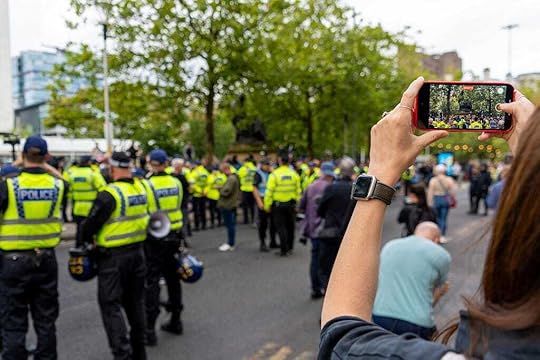 Photo by Mylo Kaye on Unsplash
Photo by Mylo Kaye on UnsplashObstruction of Justice is the crime of interfering with the justice system by among other things, destroying evidence.
When the police turn off or disable their body or dash cameras, evidence is destroyed before it can be collected, that’s Obstruction of Justice but it isn’t illegal.Anyone, including government officers, who deletes or removes recordings of criminal events from your phone is committing Obstruction of Justice but isn’t illegal.Anyone, including government officers, who prevents you from recording public events by any means, including seizing the recording device, damaging the device, blocking the viewfinder of the device, or removing you from the scene without cause, is committing Obstruction of Justice.When authorities search through your files including personal messages, social net posts, photos, and recordings without a warrant it’s an explicit violation of the 4th Amendment to the US Constitution: the right to be secure in our persons, houses, papers, and effects.While these obvious violations of Obstruction of Justice occur every day, they have not been written into law.
In the absence of a Supreme Court that favors individual rights over government power and the rights of corporations, the right to look back and record the actions of authority won’t survive court review. Therefore, we must persuade the lawmakers who represent us to:
Formalize our right to record public events.Establish that the violation of our right to record is obstruction of justice.Classify the acts of disabling body-cams, dash-cams, and any other recording devices, and the act of deleting recordings as Obstruction of Justice.What you can do:1. Identify your representatives in your state legislature and at the federal level — go to BallotPedia , type in your street address (there’s a prompt for your email but you can leave it empty), and the page will deliver links to your state and federal representatives.
2. Go to the web pages of your two federal senators and one representative, find their message forms, and compose your message, or if you don’t have time, cut/paste/edit the following text (be sure to type in their names and sign with yours).
Example text:Dear ,
Citizens’ use of cell phone cameras for recording evidence of public events has exposed thousands of crimes that would otherwise have been unseen, unreported, and allowed to continue. But the right to record evidence hangs by the thread of an appellate court decision. The 2013 Glik v Cunniffe decision of the First Appeals Court that confirmed the citizens’ right to record interactions with authority in public has not been confirmed by the Supreme Court but will surely be challenged.
The people’s right to observe public events includes our right to record criminal evidence, but that right is frequently violated by government authorities and the police. In a world where privacy is a forgotten concept and surveillance technology — private, corporate, and governmental — is increasingly used for evidence of criminal conduct, our right to record authority in public must be preserved.
Please stand up for the people’s right to record evidence of public events through the use of our mobile devices!
Compose and pass legislation to:
(1) Explicitly codify the right to record public events including the public actions of police and government agents with cameras and recorders including cell phones.
(2) Codify as Obstruction of Justice the act deleting or removing recordings from mobile devices; forcibly preventing people from recording public events by any means, including confiscating seizing the recording device, damaging the device, blocking the viewfinder of the device, etc, and by detaining, arresting without warrant, or physically disabling the person making recording by any officer of the government including police, ICE, DHS, FBI, Secret Service, etc,
Thank you for your prompt attention to this pivotal issue,
[image error]
February 26, 2025
Privacy No Longer Exists — Who cares?
Your inalienable right to privacy has been alienated. What happens next?
 Photo by Etienne Girardet on Unsplash
Photo by Etienne Girardet on UnsplashThey know where you are. They know where you’re parked. They know who you’re with. They know your credit rating. They probably know your heart rate — right now — and whether or not you’re awake. Soon they’ll know brain waves/EEG (electro-encephalogram).
Whether or not you care probably depends on who has the information and how they’ll use it. Pick your bogeyman — the government, huge corporations, your life/health/car insurance company, your bank, your spouse’s private investigator — they can all get your information.
I leave my cell phone’s GPS positioning turned off. Still, if I’m connected to wifi or in a well covered area, my carrier and those who hack it can triangulate base stations and isolate me to within a block. If I’m out in the sticks, the least they know is the time I was last near a base. In any case, they know where I’m parked.
Police surveillance cameras all but cover the United Kingdom. There are fewer in the US, but those deployed by companies and homeowners make up the difference; most store entrances have them, every ATM machine has at least one, public transportation has them (and some even function!).
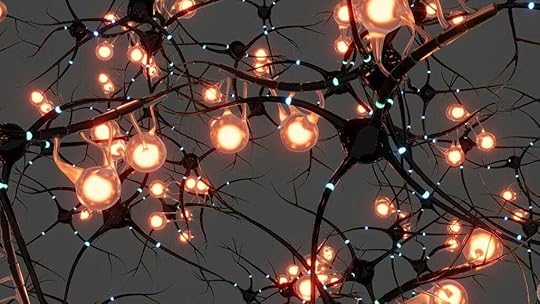 Photo by Bhautik Patel on Unsplash
Photo by Bhautik Patel on UnsplashEvery person packs biometric signatures — fingerprints, retina, voice, scent, walking gait, and the ultimate: your connectome — and we’re surrounded by devices with microphones and cameras that may or may not be active. Most microphones are active all the time, if only to catch their interrupt phrase — “Ok Google?”, “Alexa?”, “Hey Siri” — or at least that’s what your-most-feared-bogeyman would have you believe. Still, if the battery has charge, they’re capable of analyzing every sound.
Always assume that you’re being watched.That sentence might send chills down your spine, especially if you think incognito is the best way to go.
Someday, maybe next week, a teenager won’t understand the concept of being alone, or that other people might not know what they’re doing and who they’re with. They’ll have recurring nightmares about walking around town without anyone knowing their opinion.
IoT (internet of things) gadgetry has destroyed privacy — fitness watches, Ring doorbell/cameras, your refrigerator.
 Photo by Onur Binay on UnsplashWhat are you hiding?
Photo by Onur Binay on UnsplashWhat are you hiding?Successful crimes require privacy, so one could argue that privacy is less valuable than safety, after all, “What are you hiding?” Surveillance cameras help police solve crimes, and police officers who wear cameras receive far fewer complaints than those whose actions are not recorded.
I’m not sure why I don’t want others to know my actions, but I don’t. I must be hiding something, right? Maybe I don’t want you to know that occasionally (but only when absolutely necessary!) I stick a finger up my nose and do some house cleaning, sometimes my boxer shorts need a little adjusting, or my butt itches — see? I’m hiding it as a matter of courtesy. Maybe you’re guilty of these same crimes. Please don’t tell me.
Identity recognition can be run in real time on vast quantities of video and audio data, even without AI. The data can be sorted into places, times, associations with other people, proximity to crimes, and likelihoods that you have participated in a “crime.” I put “crime” in quotes because whether or not an activity is a crime depends on the observer. For example, if you ticked the “no tobacco” box on your life insurance application, then smoking is a crime for you — bang, your survivors get nothing because your insurance company found video of you firing up a stogie five years ago when your favorite team won the title.
 Photo by Vlad Deep on UnsplashWe face a potentially civilization-crippling problem as we enter the era of comprehensive surveillance.
Photo by Vlad Deep on UnsplashWe face a potentially civilization-crippling problem as we enter the era of comprehensive surveillance.If the information gathered is kept secret by corporations/government/your-most-feared-bogeymen, then that information can be selected and edited to present the bogeymen in a positive light, no matter how evil their actions, just as it can be used to present you in a negative light no matter how altruistic your actions.
Just one inalienable right stands between us and utter manipulation by the bogeyman: our right to look back at them. In 2011, the US First Circuit Court of Appeals ruled in Glik v Cunniffe that citizens have the right to record video and audio of police carrying out their duties in a public place. Notice that the Supreme Court has yet to rule.
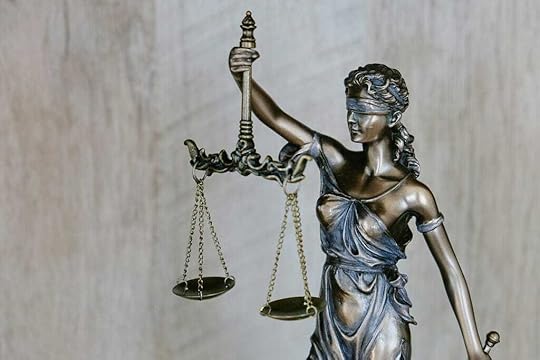 Photo by Tingey Injury Law Firm on Unsplash
Photo by Tingey Injury Law Firm on UnsplashTransparency is our only safeguard and we, the people who develop surveillance technology, are obligated to demand it!
[image error]March 18, 2022
Where the River Goes
My little dog, Dear Abby, likes to walk on a trail along a creek through the woods. Passing through the dappled light that works its way through the oaks and bay trees, the mind clears, the body settles, and we find a refuge, an island between minutes ago and minutes to come, the water right there, flowing. Dear Abby, just a swirl in the water of time, flows next to me. And you, too, the swirling vortex of you, stirring everything and everyone in your path. The water dances over rocks and around roots, calm where it’s deep and frenetic in the shallow rapids, but always moving forward.
We can look back and remember how it felt to flow and how it felt to fall. It’s hard to forget the falls. We can strive and struggle and yearn, but we can’t row upstream, not in this river. Sometimes we don’t even notice the flow of time, the canvas where we paint our lives, we’re too busy and it’s too close. It’s in the rapids of change when we most appreciate the pools of contentment.

What is eternal? And what floats away? What is conditional and what is unconditional and what’s the difference? Conditional means dependent on actions, the tiny few that we control and the vast extent of all else; conditional means fleeting and transient, the water, not the river. Unconditional means unchanging, permanent, independent of my actions or yours, unaffected by action or will.
I have friends who say that it all happens for a reason. Is the reason conditional? Do Destiny and Fate laugh?
My little dog guides me along the trail and we emerge into sunlight. The creek picks up speed here and sings the gentle song of flowing water. A song that means health and hope and brings peace to the hearts of all creatures under this particular sun. Life came to this place on conditions: a rocky planet with air and water in just the right combination, set just the right distance from just the right star.
If life is conditional, nothing that comes with life can be unconditional.
Unconditional means more than that something can survive any cause or effect — be it the course the creek takes or that the sun will rise and set or ethereal things like trust and joy — it means more than that something will outlast the interactions of mother earth and father sea, and the water that flows over one to fill the other. From the scale of the universe to the glue that holds quarks together to make protons and neutrons and everything else — it all changes. Nothing is immune to the flow of the river. Snow melts, rains come, and the river carries it all away. The river even erodes rocks into sand.
Dear Abby looks up at me, her foxy ears perked, questioning. She wags her plume of a tail, puts her nose to the trail and tugs her leash, content again, satisfied that I can solve it (she thinks quite highly of me, that little dog).
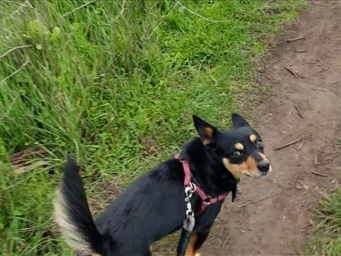
The only things that can’t be taken away are what has already happened, and our ultimate destination. And maybe taxes.
She tugs me around a curve and into the cool darkness of a massive oak that has stood here sipping this creek for centuries. We step onto a field bathing in gusts of wind that blow waves through the grass, weaving greens, yellows, and flaxen gold into the color of life.
A brook joins the creek and makes it wider and wilder. The little dog pulls me into the future, to the mouth of a ravine where the creek finds a river. The sun burns the back of my neck, and the wind pulls the moisture from my face. I concentrate on breathing — that first trick in the meditation handbook — Dear Abby’s nose reaches up and grabs whatever she can. Inhale and fill yourself, exhale and let it all go, and again. Accept what attaches you to your fleeting life so that you can let go of it. I know this river, I know where it goes, how it ends.
Surely there must be something that’s unconditional.
Love?
The currents flow in too many directions. Eric Kandel, the humble Nobel Prize winning neuroscientist, said that love is the combination of joy and trust, but trust means nothing without diving into the rapids and risking it all.
The trail takes us down to where the river carves a valley, through the scattered, spicy shade of bay laurel trees, their bark graced with soft moss. The water flows in one direction with inexorable purpose, dark in the depths, and then it hits the rocks, splashes into the air and grabs tendrils of sunlight that it scatters into dozens of tiny rainbows. Love leaves a wake of comfort through the depth of experience, even more so when it survives the rapids of change.
How many times has the course of your life hinged on the smallest grain of sand, the softest ripple in the river? The direction you turn in a grocery store, the chair you chose that day in the library, the book that altered your course, all the tiny and huge pieces, the sand and rocks, the turbulence and calm that grew you into who you are.
So many tiny causes, so many huge conditions — is the reason so simple?
Is the river unconditional? Not the route it takes, any rock can alter that — in a drought, a pebble can change its course — but not its destiny. Every river knows its destiny, and every river flows for the same reason.
Dear Abby pulls me to the river’s bank, to a patch of gravel with a gentle slope where she can drink.
What came before is unconditional: your experiences, the ripples you left behind, the vortex of emotion that creates you, and the vortices of others that stir you, even tiny Dear Abby stirs me.
Everything that happens, happens so that the river can make it to the sea.
 Dear Abby[image error]
Dear Abby[image error]
October 16, 2021
When Paradise Moves On
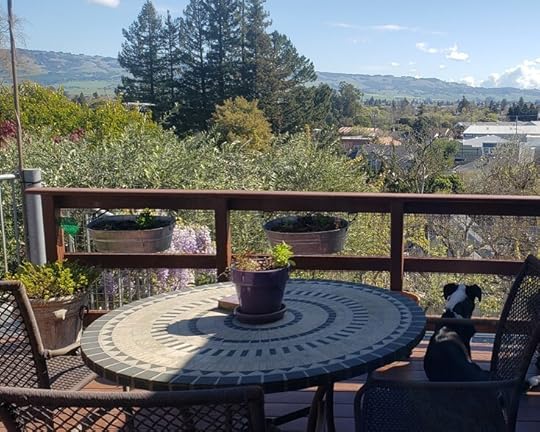 Across the Valley, what the Miwoks thought of as the world’s backbone; they called it Petaluma.
Across the Valley, what the Miwoks thought of as the world’s backbone; they called it Petaluma.Change.
Every time someone asks me if I miss being a professor, I say yes. No one ever asks me if I miss working at Jack in the Box, but if they did, I’d say yes — it was my all-time favorite job.
If I could row upstream in this river of time, I would. I even miss working at the Shell Station at the Treat and Geary off ramp.
And every time someone asks me if I miss Petaluma, I’ll say yes.
I grew up in the Bay Area, 5th generation, and, one day in 1989, stuck in traffic, I decided that it was too crowded, too expensive, too competitive, too frustrating. I wanted a place where I could afford a house. Why shouldn’t my kid have a dog? I didn’t see any way that it could happen here, so I left.
I guess that I had to leave to understand what makes California magic: day after day of clear skies, sunshine, weather in the 70s; long foggy beaches; people who tolerate others more than most, at least, more than in the places where I ended up; mountains as high as any you’re likely to find along with smaller, gentler mountains like Diablo, Tamalpais; world-class cities, not those pretend urban centers that empty every weekend, real cities, like cool, tough Oakland, fast-moving, ultra-competitive high tech mecca that is San Jose, and at the gem that sits at the Golden Gate. I think I like the rolling hills the best, dotted with oak trees and bay laurels, have you ever smelled the wind through that flaxen grass on a warm summer day? Intoxicating.
Of course, what I see as the magic of California is really the magic of Home. That special place where you belong.
And here I am, leaving again.
The thought brings me back to that time, now 17 years upstream, that my daughter and I drove across the Arizona-California border. It was raining in Arizona, and I could see a rainbow in the rearview. I stopped the big yellow truck on the side of the freeway, got out, and looked back. I told Heather, “Check it out! We’re somewhere over the rainbow.” You can imagine the eye-roll I got in reply.
Yeah, it startles me, and I wonder why Karen and I, Dear Abby and Inspector Gelert, are leaving Northern California, this spot in Sonoma County just north of the Marin border 35 minutes from the Golden Gate Bridge — the best ride this side of Disneyland; within view, on a clear day, of Mount Diablo where I can still see my childhood; a ten minute walk to the Mystic Theatre, which feels like the center of the universe; 45 minutes to Point Reyes, my favorite place in the world; and this house where Karen and I found paradise, and my dogs have lived and died. I never loved a place more.
Why leave?
There’s no good reason. Or maybe it’s the best reason.
You’ve might have heard me say, “Paradise is easier to find than it is to recognize.” Those words haunt me enough that I’m pretty good at seeing paradise when I get there. Here. But there’s a funny thing about people and paradise: people tend to cling to the place even after the paradise has moved on. I think it’s better to move on before paradise moves on without me.
It startles me the way we’re startled when the bars on the roller coaster come down and the chain jerks the ride into motion.
And away we go.
Ashland Oregon, that gem in the Rogue River Valley, just north of the California border, built around a natural spring of lithium-fortified health water, a college town, a tourist town famous for its theaters and Shakespeare festival.
The day we arrived in Petaluma, I walked into town and felt it: paradise with 150-year-old iron-faced buildings. I still feel it these years later, now worn in and comfortable. I don’t notice when the bar comes down anymore. My dogs and I have walked every street. I’ve sampled every beer, seen every band, and found myself next to wonderful companions, like you.
Karen and I have talked about moving to Ashland for years. We’ve looked at houses and agreed that we wouldn’t move unless we somehow, against all odds, could find a place as good as this one where I can see across the Valley to what the Miwoks called the world’s backbone. It shows up on maps as Sonoma Mountain, but they called it Petaluma.
Ashland was a daydream. Find a better place than this paradise in a purple house? You kiddin’ me?
Professor Buckley died one day in November. Under the weather one morning, he up and died that afternoon. Dogs have a way of becoming part of a house, no less than the beams that hold it together, dogs make it their own. Without him checking every corner each night before bed, starting every morning certain that this would be the best day of all, spending every day napping in sunny spots and shady spots — without him perched on his barking rock, our world tilted a bit. Months later, Inspector Gelert moved in; an orange and white puppy named after a Welsh hero and sired by Buddy, a Petaluma icon.
Days later, Karen found a purple house in Ashland.
“Can I walk to Bowman Theater in the time that it takes me to walk to the Mystic Theatre?” She nodded. “Is it as nice of a walk?” Nodded again. “Grand trees? Old houses? Rustic?” More nodding. I harrumphed. She took me to the house, and we walked to Lithia Spring, and I felt it. Excited and startled and ready for the bar to come down.
But when you leave paradise, how can you be sure that you’ll find another?
The only think you know for sure is that, when the bar comes down, you’re in for a ride.

September 4, 2020
You raise a strong point.
You raise a strong point.
The testing has to continue, but as long as visitors are coming from countries with a covid ratio of less than one in 10,000 (actually, I have no idea what the ratio needs to be, but it's not hard to calculate with a simulation) then a test each week would catch and contain.
On the note of modeling or simulation: the simulations are easy to assemble. They're just distributions of contacts, durations of contact, and upper limits on probabilities of contagion. Then it's a matter of running the simulation to calculate upper limits on just this sort of parameter, "max probability of leakage."
But yeah, the testing doesn't stop until the world has beaten it back with treatment, virus, or somesuch.

August 30, 2020
How to Stop Covid19 in Six Weeks
There’s a way to fully reopen in 4 weeks and go back to normal in 6 — but is there a will?
August 18, 2020
Ransom Reviews
June 9, 2020
Proof that Kneeling for the Anthem is Patriotic
America is built on ideals. Athletes who kneel during the national anthem are performing their patriotic duty as enshrined in:
The US ConstitutionThe Pledge of AllegianceThe National AnthemIn the following, I will prove, beyond reasonable doubt, that kneeling for the flag is patriotic.
Yes, proof, Quod Erat Demonstrandem
Just as the three laws of thermodynamics begin with a zeroth law to set the stage, let me point out:
0. Kneeling has never been a sign of disrespect.
People kneel before Gods and kings.
The US Constitution:The very first thing that the US Constitution says:
“We the People of the United States, in Order to form a more perfect Union …”The reason that athletes kneel for the national anthem is to “form a more perfect union.”
2. The Pledge of Allegiance
“…with liberty and justice for all.”Kneeling athletes are demanding nothing more nor less than “liberty and justice for all.”
3. The National Anthem
“…the land of the free and the home of the brave.”Kneeling during the National Anthem with a national TV audience watching means risking your career for your beliefs. That takes bravery and is an expression of freedom.
The proof:
Far from being an offense to the flag or anything it represents, kneeling is a universal sign of respect.
Right out the gate, the document that forms the foundation of the United States demands that we all pursue a “more perfect union” — exactly the goal of the athletes who kneel during the anthem.
Most of us said it every day as children. We pledge that our country demands “liberty and justice for all” — precisely what the athletes are asking for.
And, don’t kid yourself, kneeling for the flag takes bravery and can only happen in the land of the free.
QED


